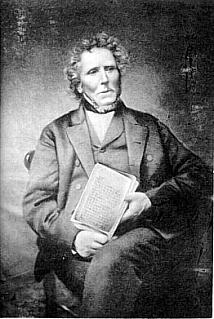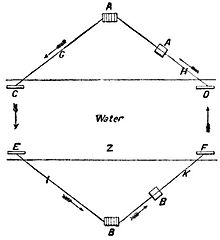James Bowman Lindsay
James Bowman Lindsay (born September 8, 1799 in Carmyllie near Arbroath in Angus , Scotland , † June 29, 1862 in Dundee ) was a lecturer , physicist and inventor . He was responsible for some inventions that had not been developed even after his death, including the incandescent lamp , underwater telegraphy and electric welding.
Life
The autodidact began after a stint at a young age than Leineweber in 1820 at St. Andrews University in Dundee with studies. In 1829 he was teaching mathematics , magnetism and electricity as a lecturer at the Watt Institution in Dundee. In 1832 he demonstrated an electric telegraph to his students in class.
His tireless urge to research then turned his interest to experiments on the electrical generation of light. On July 25, 1835, he first publicly demonstrated an electric light that was constantly generated by an incandescent lamp. Although he perfected his device, he concentrated again on wireless transmission. His profound knowledge enabled him to submit a proposal for electric arc welding as early as 1835 . In 1841 he also taught in the local prison for an annual salary of £ 50.
The inventor also considered the construction of subsea cables for power and communications transmission. He believed in the possibility of transmitting messages across the Atlantic , in which the water should be the conductor medium. In 1843 he proposed a non-insulated underwater cable with ground batteries across the ocean. A practical experiment in the port of Dundee over a distance of 120 feet (37 meters) in 1853 showed the fundamental correctness of his considerations.
In 1854 Lindsay received a patent for wireless telegraphy. In the same year he used the waters of the River Tay as an electrical conductor over a distance of about 1,600 meters from Dundee to Woodhaven .
In 1858 he published astronomical tables, which brought him a certain fame. For his services to science, the government granted him a pension of £ 100 annually. He gave up teaching in prison that year. In 1859 he also carried out a demonstration of the possibility of transmission on the River Dee and was praised by Michael Faraday and Lord Kelvin , among others .
Lindsay would have become more aware of the public if he had been a cosmopolitan and not a shy person who misunderstood the importance of his inventions in practice. The bachelor was in life despite great ideas only a modest livelihood with his lecturer.
Web links
- Biography ( Memento of 9 February 2011 at the Internet Archive ) on the website of Dundee City Council (English)
- Literature by and about James Bowman Lindsay in the WorldCat bibliographic database
| personal data | |
|---|---|
| SURNAME | Lindsay, James Bowman |
| BRIEF DESCRIPTION | Scottish inventor, physicist and astronomer |
| DATE OF BIRTH | September 8, 1799 |
| PLACE OF BIRTH | Carmyllie , Scotland |
| DATE OF DEATH | June 29, 1862 |
| Place of death | Dundee |

